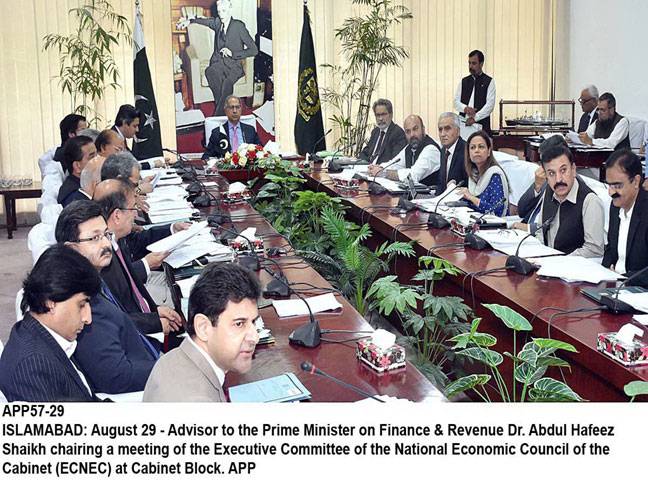ISLAMABAD - Adviser to Prime Minister on Finance and Revenue Dr Abdul Hafeez Shaikh on Thursday said that incumbent government is working hard to improve ease of doing business in the country by providing maximum facilities to the local as well as international investors. “We are working hard on ease of doing business and the numbers of businesses are gradually improving,” he said this while addressing the First Central Asia Regional Economic Cooperation (CAREC) Capital Market Regulators Forum. The two-day forum on the theme of “CAREC Capital Markets: Fostering Stronger Cross-Border Cooperation” was jointly organized by the Securities and Exchange Commission of Pakistan (SECP) and CAREC.
He further said that incumbent government should not be blamed for taking loans. The government is borrowing to meet the expenditures like defence, running civil government expenditures, public welfare and others. Sharing the details of tax collection in last fiscal year, Shaikh said that government had spent Rs2100 billion on paying interest against previous loans out of Rs3800 billion tax collection. Meanwhile, the government had transferred around Rs2400 billion to the four provinces under National Finance Commission (NFC) award. The government would have to pay further Rs3100 billion as interest payment during current fiscal year, he said. He added that government is paying huge price of the loans that had taken by the previous governments and therefore the incumbent government should not be blamed for borrowing.
Adviser invited investors to take benefit from opportunities offered by the government, saying, they would feel comfortable while doing business in benefiting from the tremendous opportunities in the sector of the economy. The PTI government believed in transparency and on behalf of the prime minister, he assured the investors that henceforth they would no more face hardships and other issues while doing business.
He said CPEC was the flagship project of Chinese Belt and Road Initiative (BRI), which will help promote connectivity among the regional countries. Through this project, Western China would get the shortest route to Gwadar Sea Port. He said after completion of the road network, energy and infrastructure facilities under the BRI and CPEC, the country would have such a platform through which inter-regional connectivity would be improved significantly. On privatisation, he said, “We are also initiating privatisation programme to bring foreign investment as well as to motivate local businessmen to come and undertake the job of running commercial enterprises”. The adviser said Special Economic Zones being built under CPEC would also help increase foreign direct investment in the country. Promoting communication and connectivity, he said was vital for regional development and by improving regulations; the transparency of the capital market could be improved. He said the capital market was important for the financial needs of the private sector.
Abdul Hafeez Shaikh said Pakistan had conveyed a message to the world that Pakistan was maintaining financial discipline and after entering the International Monetary Fund (IMF) programme, a positive image of Pakistan’s economy had built up around the globe.
The financial sector in most CAREC countries remains dominated by traditional financial institutions such as banks. Capital markets in the region are also lagging, with some CAREC members ranked low in market capitalization, according to the 2018 Global Competitiveness Report. Improved capital markets can unlock much-needed resources to boost economic growth and help achieve sustainable development, while strengthening regional cooperation that promotes more effective and efficient cross-border trade and investments.
“This forum underscores the need to build strong and meaningful cooperation among our capital markets,” said ADB Vice-President Shixin Chen. “The region needs much more financing and investments than public sector resources can alone provide. Mobilization of private sector funds, including through capital markets and long-term institutional resources, is critical to meeting development financing gaps of the CAREC region.”
Chairman SECP, Aamir Khan, in his welcome speech, considered this Forum as a first among many to develop a strong network of capital market regulators in the CAREC region and a great step towards accelerated development of capital markets in the CAREC region. He emphasized that ‘’the forum has provided an avenue for capital market regulators to exchange ideas and share best practices, besides promoting an inclusive reform agenda for attracting private capital for development and growth across the region’’. He highlighted four key needs that the region must collectively address i.e. the need for integration as an engine for growth, the need to embrace technology as an enabler, the need for linkage of capital markets with real economy, and the need for improving ease of doing business and breaking down regulatory barriers.






